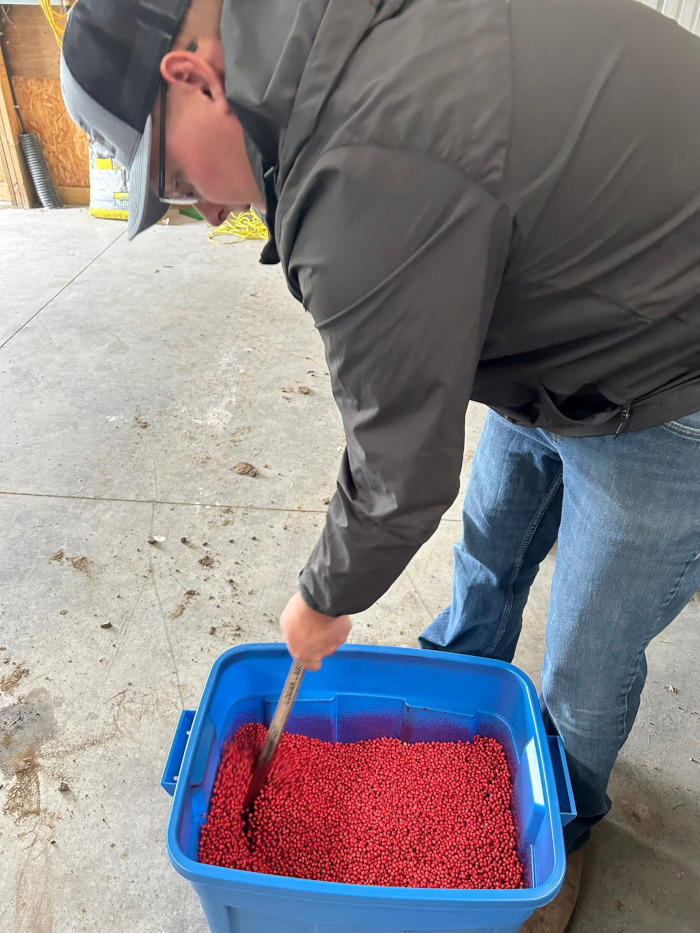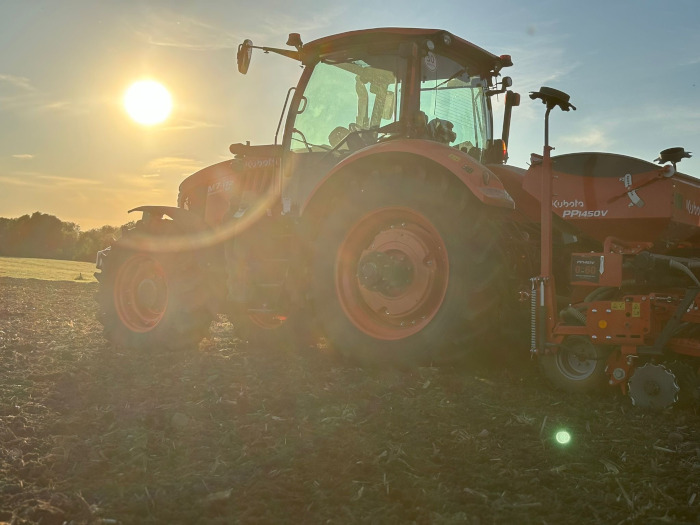
EcoTea is researching how full spectrum biology improves soil health and on-farm profitability.
The EcoTea Soil Health Discovery Project uses biological seed treatments (in soybeans) and in-furrow biological applications to demonstrate the benefit of diverse biology on emergence and plant resilience, as well as the long-term benefit to soil health.
The Project is in its first year at the Woodstock site (and third year at the Langham site). After 2 years of discovery at the Langham site, the EcoTea treated plots have already shown increased yield over untreated portions, as well as improvements to soil carbon levels and decreased in soil salinity. Now, we are examining the effects in a different soil type and different crop.
The benefit to growers from these applications is two-fold. Seed applied EcoTea allows for a more robust emergence in the spring. This is especially noticeable on lower quality soil, saline conditions, and lower nutrient areas. Additionally, EcoTea applied on seed or in-furrow in subsequent years adds millions of biological species to the soil, which works with the existing soil microbiome to improve soil aggregation, biodiversity, and soil fertility in the long term.
Project Report
EcoTea™ Discovery Farm Soil Health Research; Three Year Summary Langham, Saskatchewan & Woodstock, Ontario “Soil Health” …two words that get tossed around daily by urban consumers, climate change advocates, and farmers across North America, each group with a different opinion on what it means and why it matters. In 2022 EcoTea™ embarked on an ambitious multiyear research project at Discovery Farm Langham, Saskatchewan with a 15-acre site, to research how full spectrum biology improves soil health and on- farm profitability. In 2024 we expanded our research to Eastern Canada seeding an 8-acre site at Discovery Farm Woodstock, Ontario. EcoTea™ biological seed and soil products are applied alongside a variety of conventional ‘grower standard’ approaches, with the goal of understanding how variations of biological and fertilizer applications impact long term soil physical, biological and chemical properties and crop net income. The three-year data from Langham shows impressive net returns on the plots that used a medium to aggressive approach in working with EcoTea™ biological products.
After three crop years at Langham, the data collected from our plots strongly supports the premise that a farm should consider implementing a biological plan to increase soil ecosystem resilience and increase profitability. The Langham research site is arranged into non replicated, no till, strip plots. Each of the six plot designs represent a measured level of EcoTea™ biological applications while including yield projected ‘Grower Standard’ plots without the use of biological products. Furthermore, a continued evaluation on the benefits and/or impacts of measured reduction of spring applied Nitrogen (range 10-50%) and Phosphate fertilizer (range 10-30%) is ongoing. The herbicide and pesticide plan for all plots remain identical. The crop rotation over the past 3 seasons has been: 2022 Red Spring Wheat, 2023 Canola Monocrop and Pea/Canola Intercrop concluding with 2024 Red Spring Wheat. Rainfall and soil moisture during the first two years were equivalent to drought conditions, with a total of around 2 inches and 3.5 inches rain for crop years 2022 and 2023, respectively. In 2024 rainfall was above average, seeing a total of 10+ inches received. The cumulative three-year yield of two of the EcoTea™ plots (including an aggressive “Regen” 50% reduction in applied fertility) were equal to, or greater than the conventional grower’s standard with a 72 and 146lb reduction in applied Nitrogen from 2022 to 2024. (SEE TABLE 1 – link to our website below). All crop applications and harvest data has been conducted by Gro West Agronomy Services.
Year one at the Woodstock site was a benchmarking year to inform our research plan, and we undertook a simple comparison of EcoTea™ Dry and Liquid Seed Dressings and grower’s standard (fungicide treatment) on conventional roundup-ready soybeans. We did not implement any regenerative soil health practices or reduce fertility inputs. The 2024 growing season was favorable despite late planting due to a wet spring, with little in season stress. The Liquid Seed Dressing plot showed a slight bump in gross yield and pod count. Considerable differences in plant root zones were observed in-season on the EcoTea™ treated plants compared to grower’s standard.
We talk about the net yield and input regimes, as agronomic changes on a farm must be able to pay for themselves and cannot put farm profitability at too significant a risk. What our 3-year data from Langham proves is that a farm plan that works with diverse functional microbes, not against them, can result in significantly improved farm profitability over time. Having a complimentary chemical inputs and physical plan that supports soil microbes is equally as important to achieve these goals. This allows plant and microbial relationships to establish, nutrient cycling to enhance and improves soil health metrics like compaction, aggregation and water infiltration. These findings correlate to healthier microbial activity and therefore soil health, all throughout the crop year. We are encouraged to find that every one of these variables has significantly improved over 3 years compared to the Grower’s Standard plot. In 3 years, the Grower’s Standard plot has remained virtually static in all these metrics, whereas in the EcoTea™ regenerative plots these metrics have improved anywhere between 100%-200% and greater in some cases. It is difficult to summarize three years of research and data collection in a small write up such as this, but the conclusions we have presented above are based on observable data which can be accessed by visiting the EcoTea™ website, trials tab. (link below) Biologicals are here to stay, and these results show, with good reason, how a full function biological product like EcoTea™ applied to the seed and the soil can improve farm profitability, build more resilient soils and crops, and reduce dependence on chemical inputs for crop success!
Update submitted by EcoTea


Access the Discovery Farm Langham Field Reports
The Field Reports are an annual overview of all activities that happened at Discovery Farm Langham during the growing season including demonstration research, events and knowledge transfer.